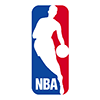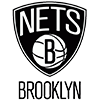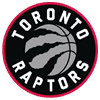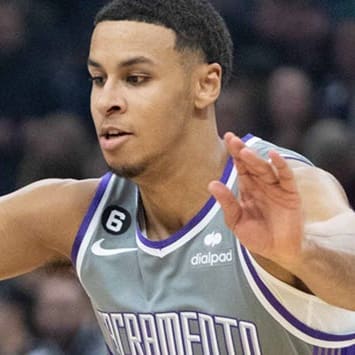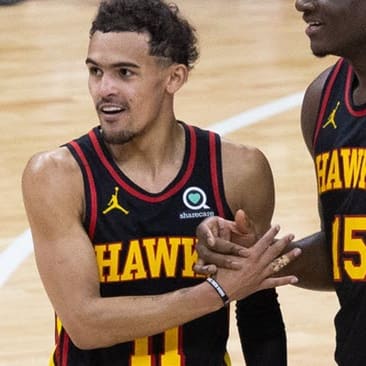After one of the more surprising seasons back in 2020-21, Young's minutes have fallen off a cliff over the past couple of years. He played in 54 games during the 2022-23 campaign, putting up 4.4 points, 3.1 rebounds and 1.0 steals in just 14.7 minutes per night. Now aged 35, it's hard to see that trend coming to an end. There is a very real chance he falls out of the rotation altogether at some point during the season, making him a tough player to roster, even in deeper formats. At best, he could have some limited streaming value should he find himself in a favorable situation at any point, likely as a result of either foul issues or injuries to other players.
In a somewhat surprising move, the Raptors opted to keep Young around for another two seasons despite being loaded in the frontcourt. The veteran will be battling Pascal Siakam, Khem Birch, Scottie Barnes and Chris Boucher for minutes -- a role that will not lend itself to fantasy value. In 16.3 minutes per game, Young ended the 2021-22 season as the 277th ranked player, with averages of just 6.2 points, 4.0 rebounds, 2.0 assists and 1.0 steals. It is reasonably safe to assume he will play a similar role this season, barring injuries to other players.
Young had a nice bounceback season with the Bulls in 2020-21. The biggest reasons were career highs in field-goal percentage (55.9) and assists (4.3) per game. The assists were the biggest surprise, as Young had previously never averaged more than 2.5, but the Bulls were comfortable utilizing him as a distributor, and he played that role better than expected. The result was Young ranking 100th in per-game fantasy production -- a nice boost from the rank of 137th he had in 2019-20. However, he'll be on a different team in 2021-22, as he was dealt to San Antonio during the offseason. While Young doesn't fit the timeline of the rebuilding Spurs, the 33-year-old could be the first frontcourt player off the bench behind Keldon Johnson and Jakob Poeltl. If Young can find minutes in the mid-to-high 20s again this season, he should be fantasy relevant given how few established offensive options the Spurs have. He makes sense as a late draft flier in standard leagues.
Young's career appears to have turned a corner, as the 2019-20 campaign saw him move to a bench role for the first time since the 2011-12 season. His first year with the Bulls saw him start just 16 times in 64 games, with his 24.9 minutes per game representing his lowest playing time since his rookie year (2007-08). He's still just 32, but Young has a lot of mileage on his body and simply won't be asked to do too much for a Bulls team that's clearly invested in its youth movement. Young still has something to offer in terms of steals (he averaged 1.4 last year and has never averaged less than 1.0 in a season) and threes (career-high 1.2 last season) along with a handful of rebounds, but that's about it. For fantasy purposes, he'll be best utilized as a fill-in when the likes of Lauri Markkanen or Otto Porter miss time.
After spending each of the last four seasons of his NBA career as a full-time starter for both Brooklyn and Indiana, Young may be in line for a slightly different role in his first season with the Chicago, where he signed a three-year, $41 million contract this offseason. Young has been a consistently solid scorer and rebounder over the course of his NBA career, and he is coming off a 2018-19 campaign with the Pacers where he averaged 12.6 points, 6.5 rebounds, 2.5 assists and 1.5 steals across 30.7 minutes per game in 81 starts. He's also slowly added a three-point shot to his reliable mid-range game, as he shot 34.9 percent from deep on 1.8 attempts per game. Now, with the Bulls expected to start Lauri Markkanen at power forward and Otto Porter on the wing, Young will likely be taking on a role off the bench in Chicago for the first time in a while. However, given that the Bulls are looking to be competitive this season and that neither Markkanen nor Porter have the cleanest sheet when it comes to their injury histories, Young should definitely still be in line for plenty of minutes in his inaugural season with the team. His workload may just not be consistently above 30 minutes like it has in recent years.
Following the departures of Paul George and Jeff Teague, Young was expected to take on a more significant role in the Pacer offense in his second year with the team. However, offseason addition Victor Oladipo was much better than expected and became an All-Star, while both Darren Collison and Bojan Bogdanovic had solid years as well. That kept Young's production from increasing much, so the 30-year-old ended with nearly an identical line to his 2016-17 campaign. Playing 32.2 minutes per contest, Young averaged 11.8 points, 6.3 rebounds, 1.9 assists and 1.7 steals. He did, however, see a noticeable drop in his field goal percentage, connecting on just 48.7 percent of his shots compared to 52.7 percent a year prior. The Pacers only made a couple of frontcourt moves this offseason. Both Al Jefferson and Trevor Booker were allowed to leave in free agency, while Kyle O'Quinn was signed from the Knicks. As a result, there weren't any moves made that would lead to a substantial role change for Young. Look for the 6-foot-8 big man to stick in the starting five, with Domantas Sabonis working as his backup. Young isn't going to put up any gaudy numbers, but his contributions across the box score will be valuable in deeper leagues and his solid steal totals for a player at his position are always a bonus. That said, it's worth it to note that Young has shot below 60 percent from the free-throw line in back-to-back seasons.
Young saw his production take a dip last season after leaving the Nets following the 2015-16 season, where the team finished 21-61. The Nets, who had few options on offense, relied upon Young for production, inflating his stats relative to his talent. Upon joining the Pacers – who featured the likes of Paul George, Jeff Teague and Myles Turner – Young’s points per game dropped from 15.1 to 11.0 and his rebounds per game dropped from 9.0 to 6.1 despite playing only 2.8 less minutes per game. That said, his effective field-goal percentage rose from 51.8 to 56.0 by switching teams. With that in mind, it’s important to note that the Pacers have replaced the talents of Teague and George with the much less talented combination of Victor Oladipo, Darren Collison and Cory Joseph. Other players were added as well, such as Bojan Bogdanovic and Domantas Sabonis, but their impact may end up being relatively small. As a result, Young projects to see more touches on the offensive side of the ball, which should result in his numbers seeing a slight uptick compared to last season. He’s far from an elite Fantasy option, but the 6-foot-8 forward accumulated seven double-doubles last season, averaged an impressive 1.5 steals per game, and will probably see an increased role with a secure 30-plus minute workload, making him worthy of consideration in a variety of formats.
Young has flown under the radar for most of what’s been a very consistent nine-year NBA career. The 28-year-old spent last season in Brooklyn, where he averaged 15.1 points, 9.0 rebounds, 1.8 assists and 1.5 steals in 33.0 minutes per game. For the most part, those numbers were close to on par with his career averages, but his rebounding made a dramatic leap up from his career mark of 5.9 per game. Young posted career bests in total rebound percentage (15.4%), as well as defensive rebounding percentage (23%), while recording his best PER since 2012-13. Traded to the Pacers in the offseason, Young is now in a vastly better basketball situation, playing alongside the likes of Jeff Teague, Paul George and Myles Turner on what looks to be a playoff-caliber team. Young will step in as the starter at power forward, with Lavoy Allen penciled in an as his primary backup. Assuming his playing time remains relatively constant, Young’s scoring, assist, and steals numbers are likely replicable. However, a reduction in rebounding seems likely considering the change of scenery, coupled with the fact that Young had never averaged more than 7.5 rebounds per game prior to last season. Young has proven to be a source of three-point production in the past, but that part of his game has waned over the past few years. After hitting a career-high 90 treys in 2013-14, Young made 38 the following season and just seven (on 30 attempts) in 2015-16.
After playing his first seven seasons with the Sixers, Young was traded to the Timberwolves last summer and ended up playing there until the February trade deadline when he was traded to the Nets in exchange for Kevin Garnett. In Young's 28 games with the Nets (20 starts), he averaged 13.8 points, 0.7 three-pointers, 5.9 rebounds, 1.4 assists, 1.4 steals, and 0.3 blocks in 30 minutes per game. The Nets signed him to a four-year, $50 million extension this offseason, so it appears Young will be the starting power forward, playing next to Brook Lopez in the frontcourt. In six postseason games, Young averaged 13.8 points in 32 minutes per game. The Nets are bereft of talent after you get past Lopez, Joe Johnson, and Young, so those three should get a lot of minutes under old-school coach Lionel Hollins, but the issue with drafting Young in season-long leagues is that he's an average producer in every category except steals. Also, if you're using a player like Young at power forward, you'll be missing out on true big men who provide big rebounding and blocks, so take that into account if you end up with him on your roster. You'll have to find the rebounds and blocks somewhere else.
Thaddeus Young came to Minnesota from Philadelphia as part of the Kevin Love trade. The 26-year-old forward spent the first seven years of his career with the 76ers and averaged at least 12.7 points in the last six of those seasons. He started 78 games for Philadelphia last year and provided a career-high 17.9 points despite reduced efficiency from the field for a losing team. He hit a career-low 45 percent of his field goals and just 31 percent of his three-pointers for 1.1 three-pointers per game. Young did bounce back with 71 percent from the charity stripe after converting only 57 percent from the line in 2012-13. While Young may need to rein in his shooting with his new team, he should be a key cog for coach Flip Saunders' offense. The green light from the perimeter may be turned off. Young only attempted 12 three-pointers in 2011-12 and 2012-13 but launched a career-high 229 long-range shots under the new Philadelphia regime last season. His field goal percentage should bump back to his career average of 50 percent, and he should be among the team's leading scorers with Kevin Martin. While Young will not replace all of Love's offensive output or board work, he may provide better defense and enough points to help the team win.
Young put up solid numbers in his mini-breakout 2012-13 campaign. He put up averages of 14.8 points (53 percent from the field, 57 percent from the line), 7.5 rebounds, 1.6 assists, 1.8 steals and 0.7 blocks in 35 minutes per game. Those numbers marked career bests throughout the stats board. With the Sixers in rebuilding mode, under newly hired head coach Brett Brown, and with a completely new system, Young will undoubtedly get ample opportunity to shine on both ends of the court, even when rookie Nerlens Noel returns to action. His uncanny ability to get steals at the power forward position will give fantasy owners a competitive advantage in many formats. Young could start the season more slowly than expected due to having to get accustomed to rookie point guard Michael Carter-Williams at the helm, as well as adjusting to a new system. However, once the core of the Sixers team gets better adjusted to playing together, he will remain consistent in his strengths that lie in the intangibles he provides – solid field goal percentage, rebounds, steals and the occasional block.
Young was once again a key reserve for the Sixers in 2011-12, coming off the bench in all but one game. Despite his role on the second unit, Young was fourth on the team in minutes played (28) and third in scoring (12.8). He was one of eight players in coach Doug Collins’ rotation that averaged at least 25 minutes a night. That kind of socialist playing time distribution tends to suppress everyone’s statistics, so Young enters the 2012-13 season low on pre-draft ranking lists. What could change for Young this season? With Andrew Bynum acquired via a trade from the Lakers, Spencer Hawes will shift down and start at power forward. Kwame Brown was also signed in the offseason to play center. Young was used almost exclusively as an undersized power forward last season. The extra size the Sixers added this offseason will still allow him to get some time as a backup power forward, but if he’s going to come close to averaging 28 mpg again, Young will have to find a way to push for minutes in the small forward rotation. That will be difficult with Evan Turner and Dorell Wright ahead of him on the depth chart there and Nick Young and Jason Richardson using most of the shooting guard minutes, stopping Turner and Wright from shifting down a position too regularly. We’re not counting Young out yet, but he’s a strong candidate to be a fantasy bust if he remains on the Sixers all season.
Young was one of the Sixers' key reserves during the 2010-11 season, and despite being used off the bench in all but one game, he averaged the fourth most minutes played (26) on the team. Sixers coach Doug Collins asked Young to capitalize on his athleticism and slashing ability last season, resulting in a huge drop in his three-point attempts -- he only took 22 three-point shots in 2010-11 after attempting over 300 in his previous two years combined. His newfound commitment to attacking the rim led to Young posting a career-high 54.1 field-goal percentage for the season. He finished the season with averages 12.7 points, 5.3 rebounds, 1.0 assist, 1.1 steals and just 1.2 turnovers while playing in all 82 games. While Young’s drop in three-point attempts takes away from a once promising component of his fantasy game, the improvements he has shown in his efficiency largely offset that. Young will enter the 2011-12 season with a similar role and should put up similar production to his previous campaign’s.
With the exception of playing 2.5 fewer minutes per game last season than the one before, Young's 2009-10 was almost identical to his 2008-09 by fantasy standards. Young's main benefit is that (a) he's a power forward who hits threes (0.7 per game last year) and (b) he's decent enough across the board. Philly traded out Samuel Dalembert for Spencer Hawes this offseason, but Young is still likely to get 30-plus minutes and has some upside as a later-round pick.
Young is a 6-8, 220 pound combo forward with excellent athleticism and good scoring ability from both inside and out. With Elton Brand healthy again Young is likely to spend a bit more time at the three this year. Young saw a big increase in minutes as a sophomore, and responded by almost doubling his scoring output (15.3 ppg) on good shooting from the field (49.5% FG). Young’s rebounding was a bit below expectation for a power forward (5.0 rpg), but with his length and athleticism he should improve on that front over time. If Young wants to move to the next level, though, he needs to start utilizing his long-distance shooting more. He has nice mechanics, a good stroke and he hits the trey at a reasonable clip (34.1% from long range). But he needs to get his 2.2 attempts/game up into the 4.5 range which would yield around 1.5 treys/game. He has that upside in the fast-paced Philadelphia offense, and if he takes advantage of it, he could develop in the Danny Granger mold into a viable fantasy impact player.
Young wasn’t one of the most hyped rookies of last season, but he acquitted himself well when given the opportunity. Playing primarily at power forward, Young shot just under 54 percent from the field and averaged 8.2 points and 4.2 boards in 74 games (22 starts). This year, Elton Brand will take over at the four spot, which will move Young back to his natural position at small forward – and where he could very well win a starting job.
The 76ers selected Young 12th overall in the 2007 NBA Draft and have high expectations for the 18-year old. He is a great athlete that will need time to develop, but he has the talent to make it happen. He averaged 14.4 points, 4.9 rebounds and 2.0 assists as a freshman at Georgia Tech but will likely need a year or two before becoming a full time player. Young will start the season behind Andre Iguodala and Rodney Carney.




